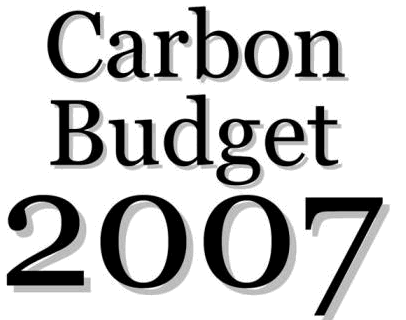|
|
|
|
|
|
|
News & Views item - September 2008 |
![]() 2007 Atmospheric CO2 Concentration Highest in 650,000 Years.
(September 25, 2008)
2007 Atmospheric CO2 Concentration Highest in 650,000 Years.
(September 25, 2008)
Data to be published tomorrow by the
Global Carbon Project (GCP) indicate:
atmospheric carbon dioxide concentration reached 383 parts per million in 2007, the highest concentration of the last 650,000 years,
the annual mean increase in atmospheric carbon dioxide was 2.2 parts per million (ppm) in 2007, up from 1.8 ppm in 2006,
human-generated emissions from combustion of fossil fuel and land use change reached 10 billion tonnes of carbon in 2007,
the growth rate of carbon emissions from fossil fuels and cement averaged 3.5% per year for the period 2000-2007, almost four times faster than the previous decade (1990-1999) when the increase averaged 0.9% per year.
This annual update (Carbon Budget and Trends, 2007) is being released simultaneously at the Paris Observatory by Australian CSIRO scientist (and GCP co-chair) Dr Michael Raupach and at Capitol Hill in Washington by GCP Executive Director Dr Pep Canadell, a carbon specialist based at CSIRO in Canberra.
However, all things considered, just at the moment the US Congress will not be paying too much attention.
ARC Federation Fellow, and Joint Director of the University of New South Wales Climate Change Research Centre, Professor Matthew England in commenting on the findings said: "This latest information on rising carbon dioxide emissions is a big wake-up call to industry, business and politicians," and points out, "There is just one aspect of the climate system that we have genuine control over -- our emissions from fossil fuels and land-use change... This latest alarming rise in atmospheric greenhouse gas concentrations is yet another message that we need to act immediately to reverse the upward trends."
___________________________________________
On September 5, 2008 Professor Ross Garnaut released the supplementary report for his climate change review saying that a global objective of 450ppm or lower would suit Australian interests better than a 550ppm goal: "However, the Review has reluctantly concluded that international agreement on a global goal of 450ppm is not immediately feasible, given that emissions are currently around 455 ppm CO2-e and rising rapidly due to fast global economic growth."
According to Professor Garnaut, based on a 550ppm outcome, Australia’s share of the burden would be a 10% reduction by 2020 and an 80% reduction by 2050 over 2000 levels.
If a "450ppm overshoot" scenario were adopted, emissions would need to be
reduced by 25% by 2020, moving to 90% by 2050.
By comparison, the European Union’s per capita target would be a 17% reduction by 2020 and a 69% reduction by 2050.
All of which is by way of saying that finding the political will to obtain sufficient reductions in anthropogenic greenhouse gas emissions to significantly slow global warming is not going to happen -- you might say that it is An Inconvenient Truth.
Professor Garnaut is to release next week his final recommendations on the design of a carbon emissions trading scheme.